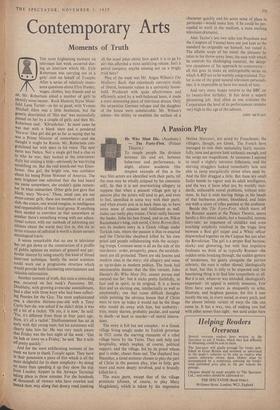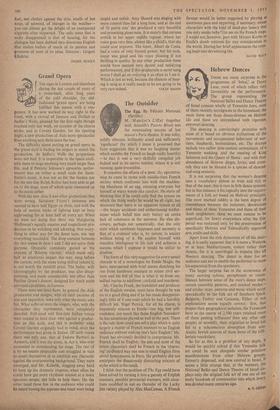A Passion Play
He Who Must Die. (Academy.) — The Forty-First. (Palace Theatre.)
To simple people the division between life and art, between behaviour and performance, is slight, almost academic (the simplest example of this is the way film actors are identified with their parts, till the man may be wholly eclipsed by his cinematic self). So that it is not overworking allegory to suppose that when a peasant village gets up a passion play the actors will tend to get, and even to feel, identified in some way with their parts; and when events join in to back them up, to have some sense of mission and fulfilment as well. Judas can really play traitor, Christ really become the leader, John his best friend, and so on. Nikos Kazantsakis's long, rich novel, Christ Recrucified, sets its modern story in a Greek village under Turkish rule, where the passion is thus re-enacted and the Christ-like shepherd killed by his own priest and people collaborating with the occupy- ing troops. Common sense is all on the side of the murderers : order, prosperity, peace, the establish- ment are all protected. There are old lessons and modern ones in the story; old allegory and some as up-to-date as modern politics. The book had innumerable themes that the film version, Jules Dassin's He Who Must Die, cannot pursue and unravel too far; but it sticks pretty faithfully, in fact and in spirit, to its original. It is a brave film and an exciting one, intellectually as well as emotionally; one that raises difficult thoughts while pointing the obvious lesson that if Christ were to turn up today it would not be the thugs who would do away with him, but authority : trim, neatly shaven, probably jocular, and scared to, death—at least to murder—of moral innova- tions.
The story is full but not complex : to a Greek village living snugly under its Turkish governor in 1921 come the starving remnants of a rebel village burnt by the Turks. They seek help and hospitality, which implies, of course, political support, and the village, led by its priest whose god is order, chases them out. The shepherd boy Manolios, a timid stutterer chosen to play the part of Christ in the passion play, tries to help, gets more and more deeply involved, and is brutally killed for it.
The main parts, except that of the village prostitute (chosen, of course, to play Mary Magdalene), which is taken by the impressive Melina Mercouri, are acted by Frenchmen; the villagers, though, are Greek. The French have managed to sink their nationality fairly success- fully, tone and gesture look authentic enough, and the songs are magnificent. At moments I seemed to smell a slightly intrusive folksiness, and the starving stragglers looked remarkably hale and able to jump energetically about when need be. And the film dragged a little. But these are small faults beside its vigour and its adult intelligence, and the way it faces what are, by worldly stan- dards, unfaceable moral problems, without solu- tions. In fact it ends leaving things in the hands of that barbarous arbiter, bloodshed, and fades out with a score of rifles pointed at the audience.
Beside this The Forty-First, which starts off the Russian season at the Palace Theatre, seems hardly a film about adults, but a beautiful, remote fairy-tale; an argument of childlike and even touching simplicity resolved in the tragic love between a Red girl sniper and a White officer shipwrecked together on the Caspian Sea just after the Revolution. The girl is a proper Red heroine, stocky and glowering, but with that impulsive freshness we think of as typically Russian—the sudden smile breaking through, the sudden gesture of tenderness, the gaiety alongside the puritan sobriety; the man is rather dismal, ideologically at least, but that is only to-be expected and the heartening thing is to find him sympathetic at all. But it is not, whatever was intended, ideologically important : its appeal is entirely sensuous. Few films have used nature as eloquently to echo, illustrate, and heighten passion; for this it uses mostly the sea, in every mood, at every pitch, and the almost infinite variety of ways the tide can come in. It has a way, too, of making you feel with other senses than sight : wet sand under bare
feet, wet clothes against the skin, smells of hot soup, of seaweed, of changes in the weather— you can almost get the delight of an unexpected cigarette after shipwreck. The only sense that is sadly disappointed is that of hearing, for the dialogue has been dubbed into disastrous English hat makes bathos of much of its passion and ionsense of most of its ideas. Director : Grigori Chukrai.
ISABEL QUIGLY

































 Previous page
Previous page